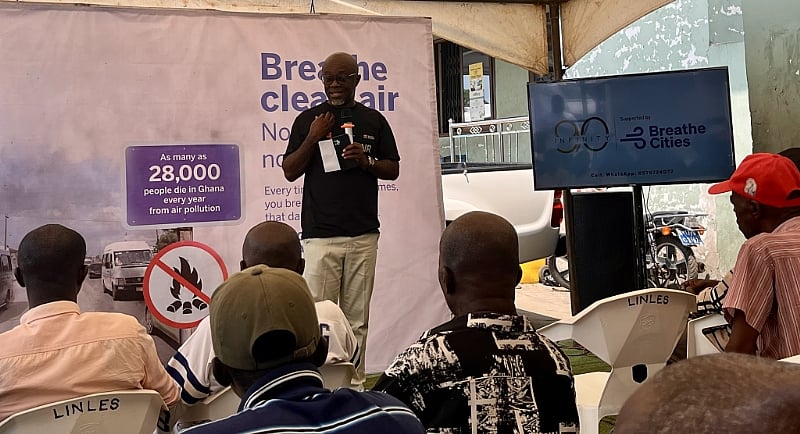The Silent Killer: Air Pollution’s Devastating Impact on Ghana’s Public Health
Ghana is facing a silent but deadly health crisis: air pollution. Nearly half of all outpatient department cases are linked to poor air quality, encompassing a range of illnesses from respiratory infections and hypertension to diabetes, stroke, and even malaria. This alarming statistic underscores the urgent need for comprehensive interventions to mitigate the sources of pollution and protect the health of Ghanaians. The Clean Air Fund (CAF), in collaboration with Infinity 970, has launched a public awareness initiative under the Breathe Cities program to address this growing concern. Their goal is ambitious: to achieve a 30% reduction in both air pollution and carbon emissions by 2030. This initiative focuses on educating the public, particularly vulnerable groups like drivers, about the sources of air pollution and empowering them to contribute to cleaner air.
The health consequences of prolonged exposure to polluted air are far-reaching and devastating. One particularly alarming trend is the rise in adult-onset asthma in Ghana, a condition often more persistent and difficult to manage than childhood asthma. Furthermore, recent research highlights the insidious nature of fine particulate matter (PM2.5), a particularly harmful air pollutant that can penetrate the bloodstream and affect vital organs, even reaching developing fetuses during pregnancy. This underscores the vulnerability of all demographics to air pollution, demanding immediate and sustained action to mitigate its impact on present and future generations. The CAF initiative emphasizes the importance of individual actions, encouraging drivers to maintain their vehicles regularly and wear nose masks on dusty roads, both to protect their health and avoid penalties for contributing to air pollution.
The pervasive nature of air pollution in Ghana is deeply concerning, with 99% of the population exposed to harmful air daily. This silent killer represents the second biggest health threat globally, and in Ghana, it ranks as the second leading risk factor for death and disability, trailing only malnutrition. While the causes of air pollution are complex and multifaceted, key contributors in Ghana include open waste burning, the prevalent use of wood and charcoal for cooking, emissions from road transport, traditional slash-and-burn agricultural practices, energy generation, industrial activity, and accidental fires. Addressing this complex challenge requires a multi-pronged approach involving policy interventions, public awareness campaigns, and individual responsibility.
The Breathe Cities program recognizes the importance of engaging communities at the grassroots level. Their comprehensive public awareness campaign will utilize a variety of communication channels, including billboards, radio jingles, television commercials, and social media content, all tailored in local languages to reach the widest possible audience. Furthermore, they will implement community outreach programs and establish hotlines to enable citizens to report air pollution incidents to local authorities. This collaborative approach aims to empower communities to actively participate in monitoring and improving air quality.
The stark reality of air pollution’s impact in Ghana is undeniable. The World Health Organization estimates approximately 28,000 premature deaths annually in the country attributable to this pervasive environmental hazard. In 2019, Ghana’s average annual PM2.5 concentration was a staggering 11 times higher than the WHO’s recommended levels. These figures highlight the urgency of addressing this public health crisis. Children and adults over 50 are particularly vulnerable to the adverse health effects of air pollution, making targeted interventions for these populations crucial.
The Breathe Cities program, by partnering with local communities and utilizing a range of communication strategies, aims to raise awareness about the sources and consequences of air pollution and drive behavioral change. The initiative stresses the importance of individual actions, such as maintaining vehicles and wearing protective masks, as well as larger-scale solutions, including policy changes and stricter enforcement of environmental regulations. By empowering citizens with knowledge and encouraging collective action, the program strives to create a healthier and more sustainable environment for all Ghanaians. The success of this initiative will depend on the collective effort of individuals, communities, and policymakers working together to combat this silent but deadly threat.














